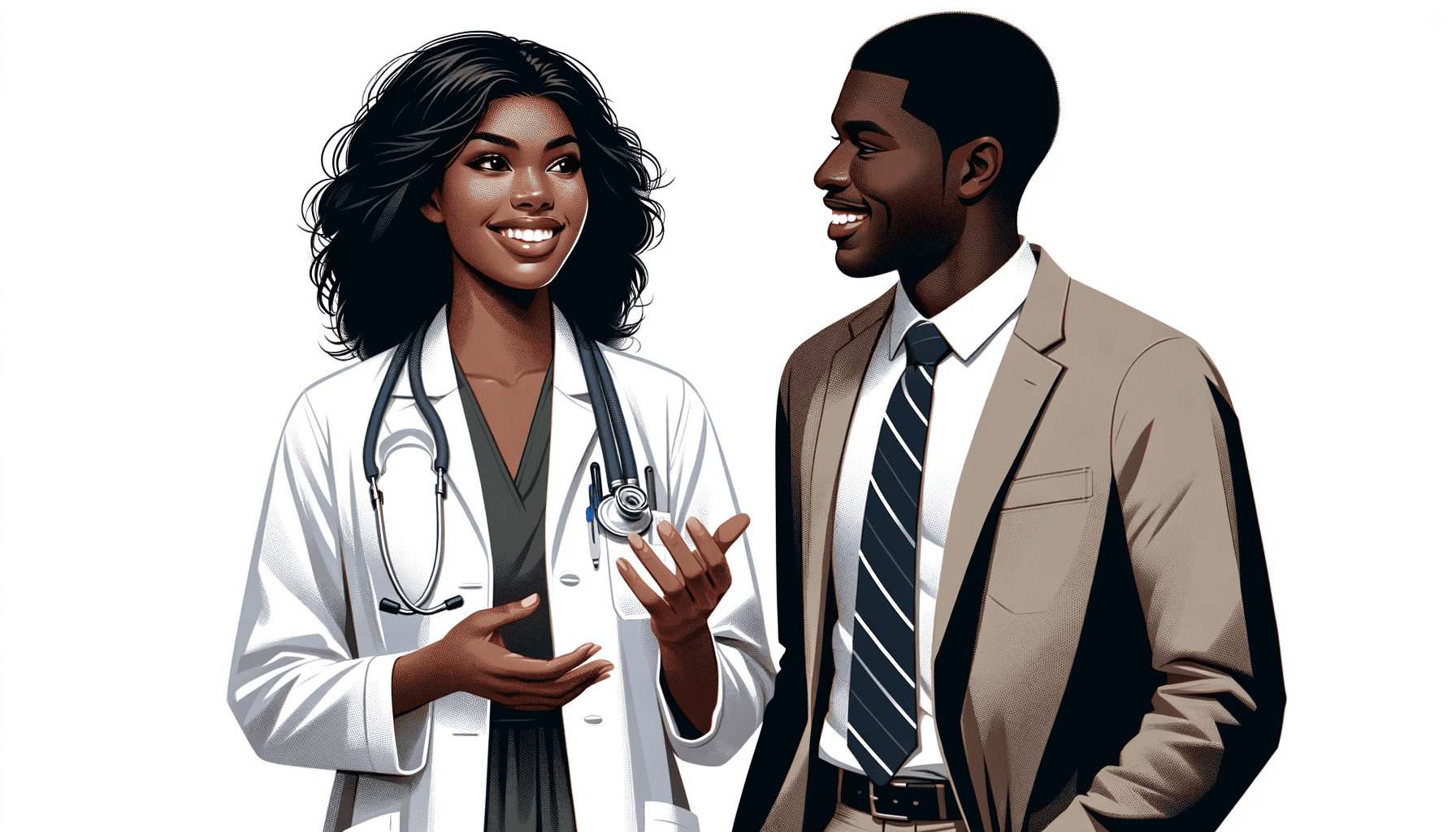Sharing is caring!
It’s tricky to tell when a doctor likes you. Do you know why?
Most of them are naturally friendly and caring people.
They’re trained to be attentive and kind, so it’s easy to misread professional courtesy as personal affection.
After all, a doctor’s job is to make you feel comfortable and cared for. This can sometimes blur the lines, making it hard to figure out if their interest in you goes beyond your health.
Think about it. Your doctor always asks how you’re doing, listens carefully, and shows empathy. That’s their job, right?
But sometimes, you might wonder if there’s something more, especially if they go out of their way to make you feel special.
So, how can you tell the difference between professional kindness and personal interest?
It’s not always straightforward, but there are subtle signs that can give you a clue. In this article, we’ll explore some key indicators to look out for.
1. Notice the Body Language
When it comes to understanding if your doctor has a soft spot for you, beyond the professional, body language speaks volumes.
Observe how they interact with you. Do they maintain eye contact a tad longer than usual, or maybe you catch them mirroring your gestures?
These subtle cues can be revealing. However, it’s crucial to remember that these signals can be misinterpreted, so don’t jump to conclusions just yet.
Now, think about their smiles. Is there a genuine warmth there?
We’re not talking about the polite, professional grin, but that sparkle in the eyes that happens when someone is genuinely pleased to see you.
It’s like comparing a sunny day to a room lit by fluorescent lights – both are bright, but one is certainly more inviting.
Still, keep in mind, that a warm smile doesn’t always mean romantic interest; it could simply signify a friendly, caring nature.
Let’s not forget about proximity. If your doctor often leans in closer than necessary or finds reasons to have slight, non-intrusive physical contact, like a gentle hand on the shoulder, it might be a sign.
This point, especially, is a delicate one. It’s essential to differentiate between professional closeness required for medical examination and something more personal.
2. Conversations Beyond Medical Talk

Does your doctor steer the discussion beyond the usual medical jargon?
If they often initiate chats about your personal life, hobbies, or plans for the future, it’s a hint they might be interested in you as more than just a patient.
These conversations tend to have a different, more personal flavor than the standard medical advice.
But hey, context is key! If these conversations happen while you’re discussing health-related lifestyle changes, it might just be a part of their job.
However, if the topics are completely unrelated to your medical situation, like discussing a movie or a book in depth, it’s a different story.
It shows they’re taking an interest in your likes and dislikes, which is not typically in a doctor’s job description.
And, of course, there’s the frequency and length of these chats. If your appointments consistently run longer because of these personal conversations, it’s a clue.
When a professional meeting starts feeling like a casual catch-up session, it’s worth noting.
But, as always, remember to differentiate between friendliness and romantic interest – it’s a thin line, and crossing it without surety can lead to misunderstandings.
3. Gauge the Extra Effort
Ever noticed your doctor going above and beyond for you?
Maybe they’re always squeezing you into their busy schedule or calling to check up on you post-appointment.
While this could be a sign of exceptional professional commitment, it might also indicate something more.
Exceptional care is one thing, but when it feels like you’re getting VIP treatment, it raises a question – why?
Consider the little things. Are they remembering details about your life that you mentioned in passing?
If they bring up that small thing you mentioned ages ago, it shows they’re paying extra attention to you.
This is not typical in a standard doctor-patient relationship, where conversations are mostly focused on medical issues.
4. The Special Treatment
A great way to gauge your doctor’s feelings is by comparing how they interact with you versus other patients.
If you notice a stark difference, like they’re more relaxed and open with you, it could be a sign.
Watch out for differences in tone, body language, and the level of personal attention.
But here’s where you need to be a bit of a detective. It’s not easy to observe interactions with other patients, so this might involve a bit of subtle observation in the waiting room.
Does your doctor greet others with the same warmth and enthusiasm as they do with you?
Do they engage in lengthy, non-medical conversations with others too?
Consider the exclusivity of any extra services or favors they offer. If they’re bending the rules or providing services that they don’t generally offer to other patients, it’s a significant indicator.
5. The Frequency of Communication: More Than Necessary
Getting calls or messages that aren’t strictly related to your health or appointments isn’t typical in a standard doctor-patient relationship, where communication is usually confined to professional boundaries.
But if your inbox has more “just checking in” or “thought you might find this interesting” messages than appointment reminders, it’s worth considering the intentions behind them.
Now, it’s not just about the frequency but also the content of these communications.
Are they sharing personal stories or asking about your weekend plans?
This shift from professional to personal in communication can be subtle but significant.
It’s like the difference between getting a newsletter from a company and getting a friendly email from a colleague – both are communications, but the tone and content set them apart.
6. Special Attention to Appearance: Noticeable Changes

Have you noticed a change in your doctor’s appearance?
Maybe they’re sporting a new hairstyle or have switched from clinical whites to more stylish attire on the days of your appointments.
While everyone likes to look their best, a noticeable upgrade in appearance during your visits might be a signal.
It’s like when someone has a date and suddenly, their usual jeans and t-shirt ensemble is replaced with something a bit more dapper.
But, of course, this isn’t about playing fashion police. It’s about noticing changes that seem to coincide with your appointments.
It’s subtle, but if your doctor seems to be making an extra effort to look good, specifically around you, it’s a hint.
But don’t make assumptions based solely on appearance. People change their style for myriad reasons, and it might not have anything to do with you.
Always look at the bigger picture and consider other signs before concluding.
[Also Read: 16 Signs Someone Secretly Dislikes You]
7. Personal Invitations Beyond the Clinic
If your doctor invites you to non-medical events or offers to meet up outside of the clinic, that’s unusual.
This goes beyond the norm of doctor-patient interactions, which are typically confined to the clinical setting.
An invitation to a coffee or a community event can be a significant indicator of personal interest.
But, it’s important to tread carefully here. Accepting personal invitations from your doctor can blur the lines of your professional relationship.
It’s one thing to bump into each other at a community event, and quite another to plan meet-ups.
These situations can lead to complications, both personally and professionally, so it’s wise to approach them with caution.
And keep in mind, sometimes these invitations can be purely platonic, especially if they’re extended in a group setting or for a professional networking event.
It’s the one-on-one, non-work-related invitations that stand out as potential signs of romantic interest.
8. Expressions of Jealousy or Disappointment
Lastly, let’s consider their reactions to your life events.
Suppose you mention a date or a significant other during your appointment.
Does your doctor show signs of jealousy or disappointment? It could be a subtle change in their tone, a fleeting expression of discomfort, or even an attempt to change the subject quickly.
These reactions, though small, can be quite telling.
It’s all about the nuances in their responses. If your doctor is usually cheerful and suddenly becomes curt or distant when you talk about personal relationships, it’s a signal.
Just like a scene in a play where the mood shifts with a character’s lines, these emotional cues can reveal more than words.
But as always, it’s crucial to not overinterpret. Everyone has off days, and what might seem like jealousy could be just a momentary reaction to something unrelated.
The key is to look for patterns over time, rather than basing your judgment on a single instance.
What To Do If You’re Developing Feelings For Your Doctor
If you find yourself developing feelings for your doctor, the first step is to take a step back and think things through.
Remember, doctors are professionals whose main goal is to care for your health. It’s not uncommon to feel a strong connection to someone kind and attentive to your needs, but it’s important to distinguish between gratitude and romantic feelings.
Before jumping to any conclusions or actions, take time to understand your emotions and consider the professional boundaries that exist.
If you still feel strongly after some reflection, consider talking to someone you trust about your feelings.
This could be a close friend or a therapist who can offer you a different perspective. It’s not advisable to act on these feelings by telling your doctor, as it could complicate your professional relationship and make your medical care uncomfortable.
Sometimes, acknowledging these feelings privately and understanding their nature is the best course of action.
[Related: 10 Powerful Signs a Woman Is Attracted to You, According to Psychologists]
FAQs

How do you know a female doctor likes you?
Figuring out if a female doctor likes you involves observing her behavior for signs that go beyond professional care.
Does she engage in conversations with you that are not strictly medical?
For instance, talking about personal interests, and hobbies, or making an effort to know more about your life outside of health matters. It’s also about noticing whether she treats you differently compared to other patients – perhaps with more warmth or a different kind of attention.
Another sign could be in the way she communicates outside of appointments.
Does she reach out more often than necessary, and are her messages more personal than professional?
Keep in mind, though, that these signs can be subtle and subjective. It’s crucial to avoid misinterpreting professional kindness as personal interest.
Observing over time and considering the context is essential before drawing any conclusions.
What are the signs a male doctor is attracted to you?
Identifying signs that a male doctor is attracted to you can be challenging due to the professional nature of your relationship.
However, certain behaviors might suggest more than professional interest.
Does he find reasons to extend your appointments or engage in personal conversations that are unrelated to your medical care?
Notice if he shares personal details about his life, which is not common in a doctor-patient relationship.
Another clue can be in his body language.
Does he make more eye contact than necessary, or do you notice a change in his demeanor when he’s around you compared to other patients?
It’s important to be cautious in interpreting these signs, as they can easily be misconstrued.
Always remember the importance of maintaining a professional boundary and consider the potential implications of a misinterpretation.
Is it ethical for a doctor to date a patient?
In most situations, it is considered unethical for a doctor to date a patient.
The primary concern here is the imbalance of power in the doctor-patient relationship.
A doctor has a responsibility to maintain professional boundaries to ensure that the patient’s care is their top priority.
When romantic or sexual feelings are involved, it can compromise the objectivity and trust necessary in a medical relationship.
Most medical ethics guidelines and professional organizations strongly advise against romantic relationships between doctors and current patients.
If feelings develop, the appropriate action would be for the doctor to refer the patient to another physician to avoid any conflict of interest. It’s important to prioritize the integrity of the medical care and the trust that forms its foundation.
Can a doctor lose their license for having a relationship with a patient?
Yes, a doctor can potentially lose their license for having a relationship with a patient. This is considered a serious breach of professional ethics.
The doctor-patient relationship is built on trust, and entering a romantic or sexual relationship with a patient can violate that trust.
Such actions can be seen as taking advantage of the patient’s vulnerability and can significantly impact the doctor’s ability to provide unbiased medical care.
The consequences for such behavior vary depending on the country and the specific circumstances, but they can include disciplinary actions, such as suspension or revocation of the doctor’s medical license.
Additionally, it can lead to legal issues and damage the doctor’s professional reputation.
Medical professionals must maintain clear boundaries to uphold the integrity and trust essential in healthcare.
Sharing is caring!
